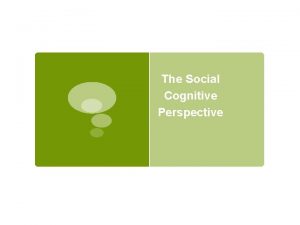Empowerment and Social Change I The Empowerment Perspective











- Slides: 11

Empowerment and Social Change I. The Empowerment Perspective

Definition • Power and control over important outcomes and resources. • An active rather than passive stance. • Positive mental health.

Levels of Analysis • Individual. • Key Concepts. • Self-efficacy and locus of control. • Participation in activities and organizations. • Research Examples. • Research repeatedly indicates that perceived control reduces the experience of stress and increases positive health and mental behaviors (Presson & Benassi, 1996; Yarcheski et al. , 2004). • Social activism may increase feelings of empowerment (Stone & Levine, 1985; Ramierez-Valles & Brown, 2003).

Levels of Analysis (cont…) • Organizational. • a. Key Concepts. • Organizations that help people gain control over there lives are empowering organizations. Those that influence policy-making decisions and allocation of resources to community members are empowered organizations. • b. Research Examples. • Empowering organizations. • Grawitch, Gottschalk, & Munoz, 2006

Levels of Analysis (cont…) • Empowered organizations. • Riger (1984). • Snow et al. (1980). • Community. • Key Concepts. • "An empowered community is one that initiates efforts to improve the community, responds to threats to quality of life, and provides opportunities for citizen participation. "

Empowerment and Social Change II. Strategies for stimulating social change

Social Change Strategies • Citizen Participation • =involvement in any organized activity in which the individual participates without pay in order to achieve a common goal. • Networking. • Consultants. • Professionals with special knowledge or skills to bring to bare on a problem. • Education and spread of information. • Critical awareness-an understanding of the larger social or political problem. • Public policy.

Strategies: Concepts and Research • Citizen Participation. • Predictors of social activism. • O'Neil et al. (1988). • Kelly and Breinlinger (1996). • Advantages. • Disadvantages.

Strategies: Concepts and Research (cont…) • Networking. • Umbrella organizations. • Clearinghouses. • Prevention First Incorporated • Advantages. • Disadvantages.

Strategies: Concepts and Research (cont…) • Consultants. • Services of community psychologists. • Needs assessment. • Program evaluation. • Advantages. • Disadvantages.

Strategies: Concepts and Research (cont…) • Education and spread of information. • Public policy.
 Anthropological social change
Anthropological social change Grade 7 social studies empowerment
Grade 7 social studies empowerment Social work: an empowering profession 9th edition chapter 1
Social work: an empowering profession 9th edition chapter 1 One point perspective box
One point perspective box Silo perspective vs business process perspective
Silo perspective vs business process perspective Social thinking adalah
Social thinking adalah Social thinking social influence social relations
Social thinking social influence social relations Physical and chemical changes examples
Physical and chemical changes examples Absolute change and relative change formula
Absolute change and relative change formula Difference between chemical and physical changes
Difference between chemical and physical changes Change in supply and change in quantity supplied
Change in supply and change in quantity supplied Physical and chemical changes examples
Physical and chemical changes examples




















